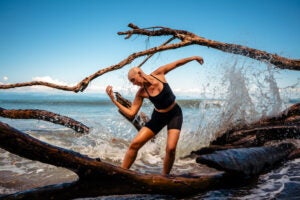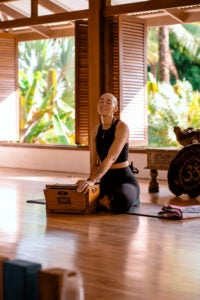“], “filter”: { “nextExceptions”: “img, blockquote, div”, “nextContainsExceptions”: “img, blockquote, a.btn, a.o-button”} }”>
Heading out the door? Read this article on the new Outside+ app available now on iOS devices for members!
>”,”name”:”in-content-cta”,”type”:”link”}}”>Download the app.
We all know what it’s like to hide. How we hide and the parts of ourselves that we cover up vary from person to person. But the reason we do it seems to be the same: Living as who we really are doesn’t feel safe.
There’s a common narrative of life taking on epic proportions once you get to the other side of hiding. But the price of admission is bringing the parts that you hide into the light.
Kirin Power is someone who has made that journey, although she’s quick to say she’s still living it. “Mine is a very literal representation of taking off the armor, the mask, or lifting the veil,” she says. Power’s story begins as a 10-year-old girl in Anchorage, Alaska, waking up to find clumps of hair on her pillow and not understanding why. It turned out to be alopecia areata, an autoimmune disorder that leads to hair loss on areas of the body.
Power, like any kid, wanted to fit in. But hiding her alopecia meant denying parts of herself. “I was always uncomfortable and felt outcasted,” Power explains. “I’d kind of crafted my life around protecting this secret, which meant that I didn’t allow myself to have many experiences.” Those included swimming, horseback riding, hot weather, or anything that would put her secret at risk of exposure.
It wasn’t that Power’s parents wanted her to “cover up” or hide her alopecia from the world. They simply wanted to protect her. Unrelated to her diagnosis, her dad eventually got a new job in San Francisco, and a move gave Power an exciting opportunity to start anew. It meant a different town and a different school filled with kids who didn’t know her as the “girl with alopecia.” It also meant access to better wig stores.
Through the years, Power crafted what she describes as an “easy breezy” demeanor. But on the inside, “There was a lot of suffering and a lot of frustration and anger,” she says, And sometimes, despite her best efforts, people would find out about her condition. “I would sleep over at a friend’s house or get drunk in college, and my wig would come off. It was traumatizing,” she says.
From Resistance to Acceptance
It’s too simple to say that Power’s yoga practice was a turning point in her alopecia journey. After college, she tried yoga but found it difficult to get out of her head and into her body. “I just felt like I was too much in my own stuff. I’d be exhausted by the end of a practice,” she says.
One day, she came across a Facebook post by Julianne Aiello, a yoga teacher who had just moved to San Francisco. Aiello had put out a call for people to help fulfill her vision of offering yoga classes outside. Her words stirred something within Power.
“I messaged her and we met to talk. It was exactly what I was looking for—doing yoga outside to get out of my head and into my heart,” explains Power. With Aiello as a teacher and Power as the events coordinator, the two grew Outdoor Yoga SF, offering yoga classes at parks, beaches, and promenades throughout the city.
Power continued taking classes. She signed up for Bhakti yoga, also known as the yoga of devotion, which she describes as “kind of a unicorn class” because it was offered by her gym and it was held outside. During the practice, Power felt like she transcended her normal life. Grounding her palms suddenly made sense because her hands could feel the soil. When she lifted her gaze, she didn’t see a ceiling but an open sky.
“I was reaching toward the cosmos,” Power recalls. “I wasn’t in a room comparing myself to others. I wasn’t looking in a mirror.” The teacher, Peter Walters, made a dad joke while students held Plank. Power experienced a release—laughing and crying at various moments.
This reaffirmed Power’s belief in the influence of doing yoga outside. “I found this passion and mission,” she reflects. “If I’m connecting to doing yoga outside so profoundly, I thought maybe others would as well.” It eventually inspired her to complete yoga teacher training.
Meanwhile, Aiello and Power continued growing a community with Outside Yoga SF. Power no longer felt stuck with her yoga practice—now, it was helping her thrive and make new connections. Power’s alopecia was still weighing on her, though not like it had in the past. How could she tell her students to embrace their authentic selves when she couldn’t do the same?
Power faced an important truth: “I understood that I would likely be very accepted without my wig on,” she shares. “What became evident was that it was my own stuff—my own ability to love myself and to love what I see in the mirror was the real conflict.”
In some moments, she felt ready to remove her wig and live her life without it. But that desire was undercut by her lifelong fear of being seen. So she decided to compromise: While co-hosting a yoga retreat with Aiello in Costa Rica, Power walked into class with her wig on, put her mat down, and took her wig off. It was both beautiful and scary, she says. And she learned something else. “Other people are not nearly as obsessed with me and things about me as I thought,” she laughs.

Once back home, reality settled in. She had always worn her wig to the grocery store, around her neighborhood, and everywhere else.
“I told myself that I would embrace the choice,” she says. “Just like we choose our outfits each day, I like to choose whether I want to put hair on or not. Yet 100% of the time when I’ve reached for it recently, it’s been a no.”

It’s a Process
Still, it’s a continuous emotional journey. Power finds herself grieving, which she didn’t expect, for her younger self who didn’t feel she deserved the unconditional love that present-day Power is experiencing. “There’s even grief about letting go of the version of me with a wig on, with hair that made me feel normal and safe,” she says.
But her yoga practice teaches her to find levity during intense moments. It also continually opens her eyes to the fact that everything is connected and everything belongs. She is ready to feel part of that.
Power has been doing many things for the first time. She’s learned she loves horseback riding. She’s also ridden in a friend’s boat, jumped off of it into the water, and felt the wind on her scalp. “Can you imagine that? Being 30 years old and never having felt the wind on your scalp before?” she asks.
If Power’s is a story of self-acceptance, some of the resounding takeaways are sometimes we hide, and that’s okay. Also, we can give ourselves permission to choose how and when we show up, to feel all of the wonderful and terrifying feelings, and to realize there is always acceptance around us—even when we’re not certain we feel it for ourselves. Power knows this now. Perhaps all of this is best captured by a story Power tells about another time she chose to take her wig off, this time in front of a close friend. Her friend looked at Power and said, “There you are.”











